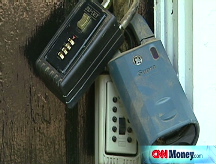Fannie Mae gives renters a break
Fannie changes policy, allowing renters to stay in foreclosed homes; no word yet of policy change from Freddie.
NEW YORK (CNNMoney.com) -- Fannie Mae, the battered mortgage giant, has agreed to act as an interim landlord for thousands of tenants living in foreclosed homes around the country.
Fannie (FNM, Fortune 500) will sign new leases for the approximately 4,000 renters in its foreclosed properties, said spokesman Brian Faith. These tenants would otherwise face eviction, even if they had been paying their rent on time, because of the owners' failure to pay the mortgage on the property.
The policy will go into effect on Jan. 9, Faith said. He said Fannie will observe an existing moratorium on new evictions. Both Fannie and Freddie Mac have agreed to temporarily hold off on evictions.
"Hopefully, this is a signal to the private sector that tenants have rights," said John Taylor, president of the National Community Reinvestment Coalition, an advocacy group. "What we don't need to be doing, during the economic crisis, is to create additional stresses on our housing industry by evicting tens of thousands of families who are paying their rent."
Freddie Mac (FRE, Fortune 500), the other government-backed mortgage giant, has not announced any changes, but a spokesman hinted that the company is developing a new policy.
"We are working through the operational details to provide something by January," said Freddie spokesman Brad German.
German said it was in his company's best interest not to evict responsible renters.
"If it's an investment property, with multiple units, we'll do our best to keep our tenants in the units, for all the obvious reasons, including that it's easier to sell the unit to another investor," said German.
The change in Fannie's policy was announced after an advocacy group, the New Haven Legal Assistance Association, accused the company of failing to obey the federal requirement to let renters in good standing stay in foreclosed properties.
Fannie and Freddie are both required, as part of the $700 billion Emergency Economic Stabilization Act passed in October, to allow tenants "where permissible" to remain in their homes until their leases run out as long as they keep paying their rent.
More than one million homes have been lost to foreclosure since the housing crisis began in August, 2007, according to RealtyTrac, an online marketer of foreclosure properties. In November alone, a total of 78,719 families lost their homes, and foreclosure filings totaled 259,085, according to RealtyTrac.
Bank repossessions of multi-unit homes with two to four apartments, which are often inhabited by renters, jumped to 22,386 this year through the end of October, up from 8,955 the prior year, according to RealtyTrac. These numbers do not reflect single-family homes, and many of those are rented, as well.
Nicolas Retsinas, a lecturer in housing studies at Harvard Business School, said that renter protection is a necessity, considering the extreme pressures placed on housing.
"Given today's market environment and the prospect of long-standing empty properties, this [Fannie Mae] policy would be prudent as well as humane," said Retsinas, in an e-mail.
Retsinas said that several state governments, including North Carolina and New Jersey, have already enacted protections for renters in foreclosed properties, without ill effect. "In those states with this policy, it does not appear to have disrupted the foreclosure process," he said.
It is unclear whether the banking industry would adopt similar changes to its mortgage lending policies to protect responsible renters.
Tom Kelly, spokesman for JPMorgan Chase (JPM, Fortune 500), said his company did not have any immediate plans to mimic the Fannie Mae policy.
"No, we just learned of Fannie Mae's plan and we are reviewing it," said Kelly.
Bank of America (BAC, Fortune 500) and Citigroup (C, Fortune 500) did not return calls. ![]()


